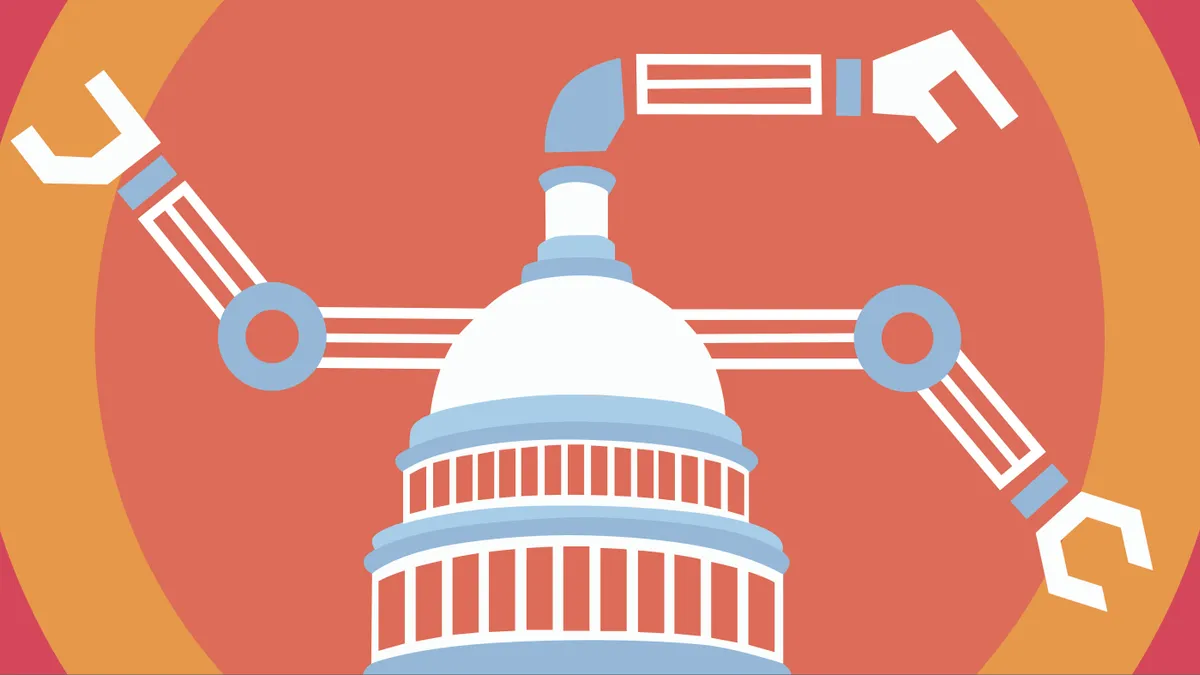Data, data, data
New orders for manufactured goods leaped 3.1% in February, according to the U.S. Census Bureau. Transportation equipment led the pack, skyrocketing 7.1% month-to-month.
Shipments grew at a slower pace, 0.9% in February, but 0.4% higher than January.
The Reaction: All signs point to the economy continuing its surge, with unemployment at record lows and February's huge jobs increase, so it's unsurprising the Federal Reserve raised rates on Wednesday and has already scheduled three more increases later this year, per a Bloomberg report.
What the omnibus spending bill means for supply chains
Vox outlines some notable parts of the spending bill, including increased funding for U.S. Customs and Border Protection (which could assist counterfeit crackdown efforts), $900 million for a new commuter train tunnel under the Hudson River connecting New Jersey and New York and increased funding for the TIGER grant program for transportation projects so that its budget hits $1.5 trillion.
The Reaction: While movement on an infrastructure bill is slow, increased funding for the TIGER program could help the freight industries and local municipalities start necessary projects, especially as the various freight associations continue to desperately request funding.
Report says steel tariff effects will be 'negligible'
CBRE, the largest real estate services and investment firm in the world, released a report determining the effects of Trump's steel tariffs will have a "negligible" impact on the U.S. economy.
In a media advisory emailed to Supply Chain Dive, CBRE said "industrial building construction costs may rise modestly" and also noted that the "shortage of skilled labor continues to have a more significant effect on total construction costs than does higher steel prices."
To further complicate the steel tariff debate, the Department of Commerce announced earlier this week companies can now apply for exemptions from the tariffs, according to Thomasnet.com.
The Reaction: It's still early to guess what the net fallout (or gain) will be from Trump's tariffs. What's worrisome now is the rhetoric of Trump's decision and the potential for a trade war. Just this morning, China released a list of U.S. products it is considering to target with tariffs.
And closer to home, trade discussions look a little rocky. The American Railroad Association, for example, wrote a letter earlier this week urging Congressmen to consider the sheer volume of international trade the AAR conducts with Canada and Mexico.
While many industries agree NAFTA needs reform, it is becoming increasingly tricky for regulators to navigate the needs of American business with maintaining international relations going forward.
AVs aren't going away anytime soon
The New York Times reported Toyota halted autonomous vehicle testing after Uber's self-driving car struck and killed a pedestrian in Arizona earlier this week.
The Reaction: Despite the deluge of articles decrying AVs and petitioning regulators for strict regulation regarding their development, the Supply Chain Dive team doesn't think AV development will be slowing down any time soon.
According to numerous surveys (by Gallup and the Pew Research Center), American consumers are still apprehensive of AVs, but the same cannot be said about the auto industry and regulators, both of whom are pushing for the tech's development.
Regulators and industry leaders have been constantly discussing the inherent dangers and benefits of AVs for months now, and the fact is, statistically speaking, AVs will cause far fewer accidents and fatalities than human drivers.
The Uber incident will likely accelerate conversations between regulators and automakers, so we'll probably see adjustments to the AV START Act currently sitting in the Senate as both parties seek to advance the technology in the safest way possible. AVs clearly aren't safe enough yet, but that doesn't mean they won't be.
Looking ahead
Lawmakers just introduced a bipartisan infrastructure bill to the House, according to The Hill, which would help accelerate important infrastructure projects through an approval process for funding, but doesn't address the infrastructure funding problem.
The April 1 deadline for ELD compliance is looming. Check the stats on compliance here.






















